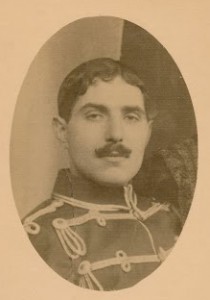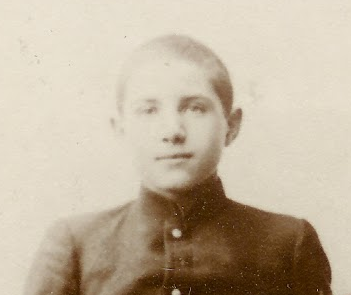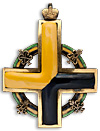 (b. Voronki, Chernigov Province, Russia 1892 – d. Sofia, Bulgaria 11 December 1924)
(b. Voronki, Chernigov Province, Russia 1892 – d. Sofia, Bulgaria 11 December 1924)
Nikolai ” Kolya” Mikhailovitch / Николай Михайлович Кочубей (1892 -1924) was the son of playwright, Mikhail “Mikhailo” Nikolaievitch / Михаил Николаевич Кочубей (1863-1935) and Pelegea Dmitrievna (née Onoshko) /Пелагея Дмитрьевна Онощко (1863-1930). His mother was considered among the most beautiful women in the region and while her beauty & kindness won her the affection of Mikhailo and their children, her intellect and stubborness helped save the estate of Voronki from being seized by creditors at a crucial time. She was loyal to her beloved village of Voronki but with her family she fled the estate in 1918 when it was seized by the Bolsheviks and while she spent sometime in Kiev, she died in the countryside at the end of 1930. Even with the departure of all her sons during the Russian Civil War, it was her daughter, Elena “Nelly” Mikhailovna / Елена Михайловна Кочубей (1890-1972) and her granddaughter little Olga Dmitrievna Wickberg (1921-1985) that would remain near her until her death.
In contrast, Kolya’s father was a larger-than-life playwright, actor, director & benefactor whose generous heart and weak self restraint laid havoc and happiness in equal measure in his wake. While frequently absent due to his engrossing attachment to his obligations as Marshal of the Nobility of Kozeletsk (and then Borzensk) as well as the various educational institutions that he supported and his various estates, Mikhailo found comfort in the company of his various mistresses and would travel abroad frequently with them. In the twilight of Russia’s Revolutionary years he chose to flout conventional behaviour and created both social and financial difficulties for himself and his family by renting land at six rubles / desyatin (approximatelz a hectare) which was well below the average of 18 rubles. The consequences of this destructive behaviour would have far reaching consequences on all his sons. Young Kolya’s education was most likely disjointed as photographic evidence suggests that he might have begun his education in Kyiv at the Second Kyiv Gymnasium and at a certain point would have been transferred to St. Petersburg to attend the Nikolaevskiy Kadetskiy Corpus /Николаевский кадетский корпус located at 23 Ofitserskaya Ulitsa. He graduated from their in 1912. He certainly did not complete the full seven year course because he would have arrived at the mid-point of the Kadet program. Perhaps it was in 1906 when Kolya was a 13 year old student at the Gymnasium or already a Kadet, and his father sold off one of the family’s prized estates, Kinoshevka in the wake of the civil unrest of 1905 that he was sent to St. Petersburg. The timeline aside, Mikhailo abandoned his family and left for Italy and then France but it is unclear when. It was likely sometime after 1912 and perhaps even 1913 in the company of one of his mistresses Natalia Dmitrievna (née Sidorenko) / Наталия Дмитриевна Сидоренко (? -1941). It was said that she was a school teacher in the school that Mikhailo built and financed in the village of Voronki. It is not clear if Kolya ever saw his father again after leaving Kiev and being sent to St. Petersburg but he graduated from the Kadets in 1912 and was accepted in the Yelisavetgrad Cavalry School /Елисаветградское кавалерийское училище based in Yelisavetgrad (today: Kropivnitsky and in Soviet times: Kirovgrad) about 300 km south of Kyiv.

To set the stage for young Kolya’s upbringing and idyllic childhood, one needs to look no further than the bucolic estate of his grandparents (Nikolai Arkadievitch / Николай Аркадьевич Кочубей (1827 -1868) and Elena “Nelly” Sergeievna (née Princess Volkonskaya) / Елена Сергеевна Волконская (Молчанова, Кочубей, Рахманова)( 1835-1916)) that was called Voronki / Вороньки (Черниговская область) in the Chernigov Province and Kozeletsky region (today Bobrovitskiy Region and not to be confused with a village of the same name in the Poltava Province). No important buildings from this era remain but like any typical estate it had the main house, which was a large wooden structure with decorated windows and a beautiful serpentine staircase that led to a beautiful park. Surrounding it were buildings that would house the laundry facilities, the kitchen the livestock etc. In the village was a beautiful church built in the brick old Russian revival style. The estate is located in the southern part of the Chernigov province on the banks of the Supoi river. Even today, it is renowned for its unspoilt beauty and incredible nature. The land is characterized by vast plains punctuated by stands of pine trees and birch trees which are separated by meandering rivers and beautiful lakes. Of course, today this region is in Ukraine, and its link to the family stretched from the family’s political role in the administration of the province, to the many families linked by marriage who populated the province and its large estates.
When ‘Kolyachka’ was born, he joined his eldest brother Vassili “Vassya” Mikhailovitch /Василий Михайлович (1889-1920) and his older sister Nelly. Shortly after his arrival, his mother would give birth to Mikhail “Misha” Mikhailovitch / Михаил Михайлович (1893 -1963) and a few years later she gave birth to the youngest sibling, Sergei “Seriezha” Mikhailovitch / Сергей Михайлович (1896 -1960).
Nikolai had an idyllic childhood running amongst the various outbuildings of the estate and playing with the farm animals, riding ponies and being spoiled by the buxom peasant women who marveled at his charm and sense of humor. His grandmother, Nelly lived on her estate, Veisbokhovka which was only 30 km away but she took an active role in his education and upbringing. He watched plays and heard operas at the estate’s own theatre. He would learn to recite poems and perform in front of guests and his father Mikhailo, an accomplished photographer would take pictures. In addition to speaking Ukrainian with the peasants, he learned to speak French, Russian and German. He became an accomplished horseman and like many boys of his class, he was often out with the brown and white springer spaniels and his gun, shooting waterfowl, hares and foxes. He dressed in traditional clothes with a long linen embroidered shirt and a leather belt around his waste.
The idyllic life was not meant to be eternal and as a 5 year old boy, he watched Vassya leave for school most likely to Kyiv and to attend the Second Kyiv Gymnasium. Three years later, like all children at the age of ten, he too was sent to Kyiv.
Kolya would come home for the holidays and initially make the journey up from Kyiv and then when he was transferred to St. Petersburg he would make the much longer journey via Moscow. From there, he might have been picked up at the train station (recently installed) by one of the new luxury French automobiles that his father owned and driven along the bumpy roads to Voronki. He would arrive home wearing his thick wool school uniform and his hair was cut short in a military fashion, short and close to the scalp. When his father was present he would shower his young Kolya with kisses and give him and the other children gifts of books, sweets and wooden toys. His affection and kindness was a happy memory even when juxtaposed against the unforgivable legacy which he forced his children to carry and his unpardonable departure from their lives in 1913.
The little boy grew tall with long strong legs that allowed him to comfortably hold his mount and execute complicated hussar manoeuvres. While it would sound romantic to think that his horsemanship was somehow tied to cossack blood coursing through his veins, it’s likely that practice and necessity were better teachers and then any genetic predisposition as he turned into a dashing Hussar. He possessed the character traits of the romantic image of the Russian Hussar officer. He was over six feet tall, with a handsome moustache that focused ones view on his long oval face and softened his full lips. The heavy moustache was parted on each side and he would make sure to wax the delicate tips so that they subtly curled skywards in the way that only a vain hussar officer would groom himself. His hair was thick, dark and curly but he made sure to keep it under control with more wax and it lay close to his scalp with only a hint of the wavey hair falling onto his high forehead. He had a devil-may-care attitude which was all the more charming because of his sense of humor and his love of games and merriment. His hands were never to far from his papirosi or cigarettes, which he would carefully take into his hand and then proceed to pinch the narrow filter two places and in opposite directions. He was quick to sing a ballad and his strong voice was a welcome accompaniment to the voices of his brothers. They would spend countless nights around the fire singing, smoking, drinking and playing guitar. It was a perfect Hussar’s life.
The chidren of Mikhailo Kotchoubey stayed near their mother and grandmother in their respective estates in Ukraine. At the time of Nikolai’s brief schooling in St. Petersburg at the Nikolaivsky Kadets, many members of the family were at Nicholas II’s court. It is not clear what relationship if any they had with Mikhailo’s children as his irreverent behaviour may have ostracised this branch of the family from the other Kotchoubey’s. Nonetheless, the Kotchoubey name was well known in court and military circles. Nikolai’s distant aunt, Princess Elena Konstantinovna Kotchoubey (née Beloselsky-Belozersky) / Елена Константиновна Белосельская-Белозерская (1869 – 1944) was a lady in waiting to the Empress Alexandra Feodorovna before she married her husband Lt. General Prince Sergei Viktorovitch Kotchoubey / Виктор Сергеевич (1860 -1923). He was a close friend and an aide-de-camp to Nicholas II and had accompanied the Emperor on a tour of Asia including Japan when Grand Duke Nikolai Aleksandrovitch was still Tsarevitch. Prince Sergei and his wife, were the last owners of the famed Dikanka estate in Poltava. Yet another uncle, Vassili Petrovich Kotchoubey (1868-1940), a Guard’s officer was to be elevated to the rank of Master of Ceremonies (from Kamer-Junker / камер юнкер) of the Imperial Court in 1912.
The Voluntary Army under Gen. Anton Denikin
As did his brother Vassili, Nikolai completed the Yelisavetgrad Cavalry School. He graduated with the rank of Kornet, with seniority in July 12, 1914. By the end of 1917 and the disbanding of the regiment, Nikolai had reached the rank of Stab-Rotmeister or Captain. He graduates of both the Korpus and the Uchilishe were destined to serve in cavalry units and the Kotchoubeys were no exception. While two branches of the fa mily would serve in the Chevalier Guard reginement (Кавалергардский полк) , Nikolai’s older brother, Vassili, also served in the 11th Izumskiy Hussar regiment of General Dorokhov (11-й гусарский Изюмский генерала Дорохова полк) and in 1917 was transferred to the 10th Ingermanland Hussar Regiment (Ингерманландский 10-й гусарский полк).
mily would serve in the Chevalier Guard reginement (Кавалергардский полк) , Nikolai’s older brother, Vassili, also served in the 11th Izumskiy Hussar regiment of General Dorokhov (11-й гусарский Изюмский генерала Дорохова полк) and in 1917 was transferred to the 10th Ingermanland Hussar Regiment (Ингерманландский 10-й гусарский полк).
Nikolai and his two other brothers Vassili fought in their hussar regiment from the beginning of WWI.
Along with his brothers he joined the Voluntary Army. It was November 1918. The brothers were put to work in the intelligence operations of the White Army and served in the OSVAG (office of the Russian Press). They were involved in highly classified missions throughout 1919. Following Denikin’s defeat in 1919 and his retreat to Crimea, Nikolai and his brothers would serve under General Pyotr Wrangel. They were evacuated from Sevastopol aboard various ships of the infamous Wrangel fleet in late 1920. With the rest of the fleeing White army, Nikolai traveled briefly to Constantinople, but tragically his eldest brother Vassili was lost at sea and died. In 1921, he traveled to Sofia, Bulgaria with his brothers Michael & Sergei.
A thriving White Russian community emerged in Sofia in the 1920s and the three remaining brothers, started to rebuild their lives in emigration. While Michael & Sergei had married two sisters (Mankovsky) in 1919, Nikolai, a dashing cavalry officer with a great voice and zest for life fell in love and married Sofia Alexandrovna (née Grobovskaya) / Софья Александровна Грабовская. Tragically, shortly after he was married, he died in 1924 in great pain most likely from stomach or pancreatic cancer.

